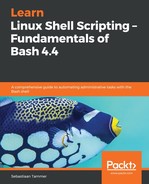Something we've done in many of our scripts is checking arguments. We started our library with a function that allowed checking the number of arguments the user gave as input. Another action we frequently performed on user input was validating the input type. If our script requires a number, for example, we'd like the user to actually enter a number and not a word (or a written out number, such as 'eleven'). You might remember the approximate syntax, but I'm sure that by now if you needed it again, you would look through our older scripts to find it. Doesn't that sound like the ideal candidate for a library function? We create and thoroughly test our function once, and then we can feel safe just sourcing and using it! Let's create a function that checks if a passed argument is actually an integer:
reader@ubuntu:~/scripts/chapter_13$ vim ~/bash-function-library.sh
reader@ubuntu:~/scripts/chapter_13$ cat ~/bash-function-library.sh
#!/bin/bash
#####################################
# Author: Sebastiaan Tammer
# Version: v1.2.0
# Date: 2018-11-17
# Description: Bash function library.
# Usage: source ~/bash-function-library.sh
#####################################
<SNIPPED>
# Checks if the argument is an integer.
check_integer() {
# Input validation.
if [[ $# -ne 1 ]]; then
echo "Need exactly one argument, exiting."
exit 1 # No validation done, exit script.
fi
# Check if the input is an integer.
if [[ $1 =~ ^[[:digit:]]+$ ]]; then
return 0 # Is an integer.
else
return 1 # Is not an integer.
fi
}
Because we're dealing with a library function, we can be a little more verbose for the sake of readability. Too much verbosity in a regular script will reduce readability, but as soon as someone is looking at the function library for understanding, you can assume they'll like some more verbose scripting. After all, when we call the function in a script we'll only see check_integer ${variable}.
On to the function. We first check if we've received a single argument. If we did not receive that, we exit instead of return. Why would we do this? The script that calls should not be confused about what a return code of 1 means; if it can mean that we either did not check anything, but also that the check itself failed, we're bringing ambiguity where we don't want it. So simply said, return always tells the caller something about the passed argument, and if the script calls the function wrong, it will see the full script exit with an error message.
Next, we use the regular expression we constructed in Chapter 10, Regular Expressions, to check if the argument is in fact an integer. If it is, we return 0. If it is not, we'll hit the else block and 1 will be returned. To emphasize this point to someone reading the library, we included the # Is an integer and # Is not an integer comments. Why not make it easy on them? Remember, you do not always write it for someone else, but if you look at your own code a year later, you will definitely also feel like someone else (again, you can trust us on this!).
We'll do another search-replace from one of our earlier scripts. A suitable one from the previous chapter, password-generator.sh, will serve this purpose nicely. Copy it to a new file, load the function library with source, and replace the argument checks (yes, both!):
reader@ubuntu:~/scripts/chapter_13$ vim library-password-generator.sh
reader@ubuntu:~/scripts/chapter_13$ cat library-password-generator.sh
#!/bin/bash
#####################################
# Author: Sebastiaan Tammer
# Version: v1.0.0
# Date: 2018-11-17
# Description: Generate a password.
# Usage: ./library-password-generator.sh <length>
#####################################
# Load our Bash function library.
source ~/bash-function-library.sh
# Check for the correct number of arguments.
check_arguments 1 "$@" ||
{ echo "Incorrect usage! Usage: $0 <length>"; exit 1; }
# Verify the length argument.
check_integer $1 || { echo "Argument must be an integer!"; exit 1; }
# tr grabs readable characters from input, deletes the rest.
# Input for tr comes from /dev/urandom, via input redirection.
# echo makes sure a newline is printed.
tr -dc 'a-zA-Z0-9' < /dev/urandom | head -c $1
echo
We're replaced both the number of arguments check and the integer check with our library functions. We've also removed the variable declaration and used $1 directly in the functional part of the script; this is not always the best thing to do. However, when input is only used once, first storing it in a named variable creates some overhead which we might skip. Even with all the whitespace and comments, we still managed to reduce the script lines from 31 to 26 by using function calls. When we call our new and improved script, we see the following:
reader@ubuntu:~/scripts/chapter_13$ bash library-password-generator.sh
Incorrect usage! Usage: library-password-generator.sh <length>
reader@ubuntu:~/scripts/chapter_13$ bash library-password-generator.sh 10
50BCuB835l
reader@ubuntu:~/scripts/chapter_13$ bash library-password-generator.sh 10 20
Incorrect usage! Usage: library-password-generator.sh <length>
reader@ubuntu:~/scripts/chapter_13$ bash library-password-generator.sh bob
Argument must be an integer!
Great, our checks are working as expected. Looks much better too, doesn't it?
